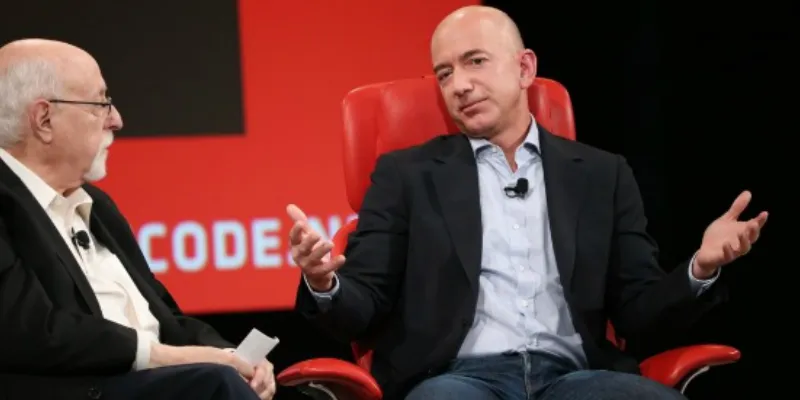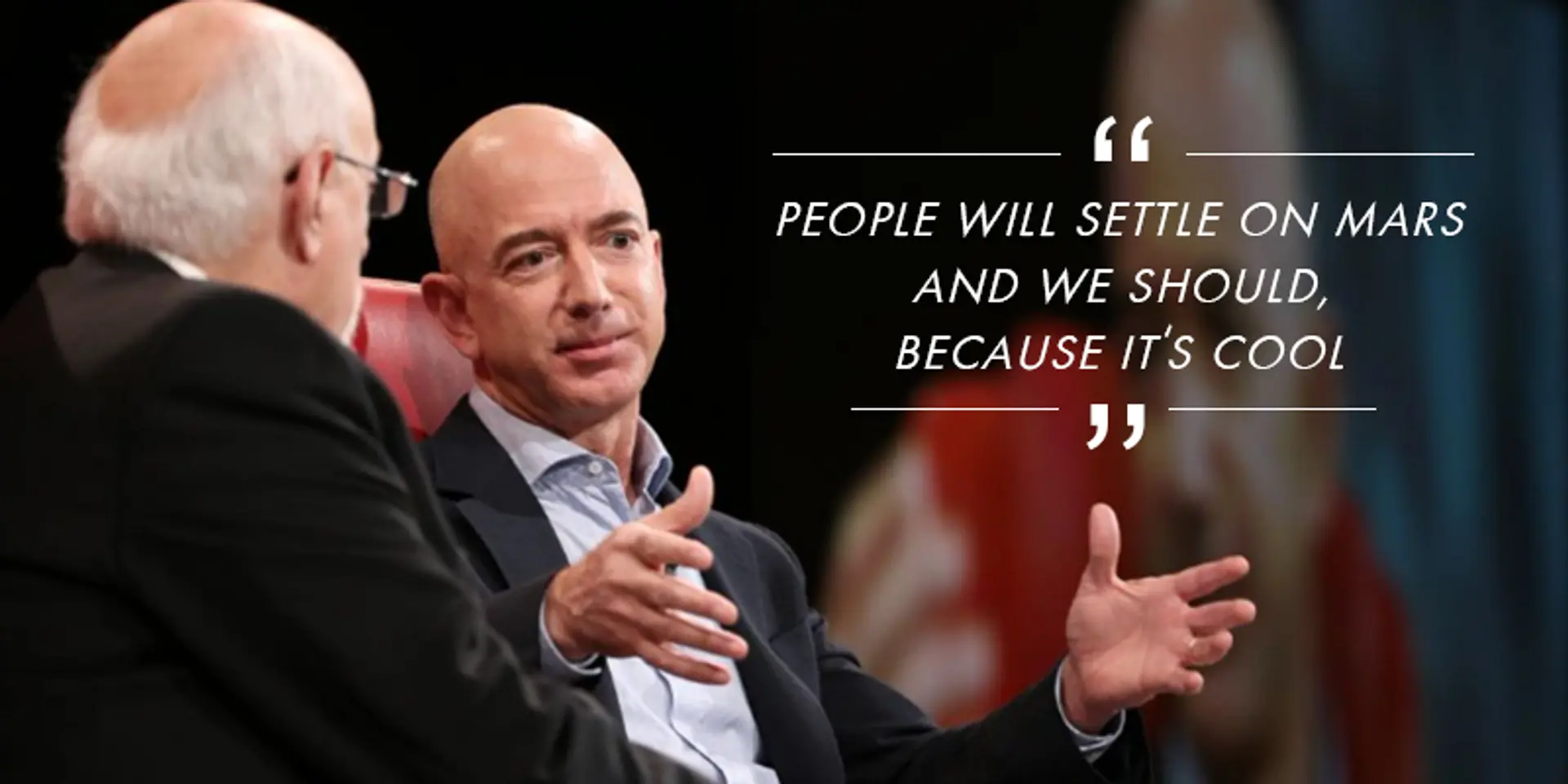Jeff Bezos' big bets on AI, physical stores and space exploration
Jeff Bezos, Founder and CEO of Amazon, and Walt Mossberg, Co-founder of Recode, spoke at Recode's annual conference 'Code' at Rancho Palos Verdes, California earlier on Wednesday. Talking about the early days of Amazon, the startup ecosystem and the present day, Jeff said,“ The longer you’ve been around in the tech ecosystem, the more humble you become.”
While ecommerce and Amazon Web services(AWS) are among Amazon’s core offerings, Jeff Bezos has been expanding his portfolio to Artificial Intelligence(AI) with Echo, opened physical stores and also focused on 'moonshots' like space exploration with Blue Origin. Most of these topics came up during the discussion. Here are some of the key highlights -

Image credit- Recode Twitter handle
The Future of Artificial intelligence
Amazon launched Echo, its a wireless speaker and voice command device and made it available to the public in June 2015. The device has multiple use cases like music playback,making to-do lists, setting alarms, providing weather, traffic and other real time information which is powered by Amazon's voice assistant Alexa. Jeff noted that Amazon spent four years working on it behind the scenes with more than 1,000 people. He said,
Amazon has two SDKs for Alexa: you can embed Alexa's voice service, or you can teach Alexa a new 'skill'...Those two things work together.
When Walt spoke about the intense competition in the voice assistant and AI space from the likes of Apple, Microsoft and Google, Jeff added that we would see major tech companies as well as new-age startups trying to crack the problem. He believes that Amazon has the edge because of its background and the training data sets it has to improve algorithms. Talking about the market size, he said,
It's gigantic — natural language understanding, machine learning in general. It's probably hard to overstate how big an impact it's going to have on society over the next 20 years.
Also though humans have always wanted computers they could talk to since the dawn of Sci-fi, he believes that smartphones are not going away. He said, "It's not like voice interfaces are going to replace screens. There's so much more to come. It's just the tip of the iceberg."
Physical stores and logistics
While Amazon's first shot to fame was as the world's largest catalogue of books, the company never had a physical book store. Recently Amazon launched its first physical book store in University Village mall in Seattle and plans to launch more. Jeff admitted that the physical stores are experiments and they are still figuring out how to integrate it with Amazon's current 'Prime membership'.
Bezos also added that unlike Amazon's online catalogue, the physical bookstores would stock a relatively low 5,000 titles based on Amazon's data. He said, "If you come looking for a specific book you'll probably be disappointed, he says. The store is more about browsing, discovery, and having a fun space to wander around in. Almost every book in the store will have five stars, save for the bestsellers."
Walt interjected, "Isn't that what all the bookstores did when you started killing them?"
Jeff laughed and admitted that they are now seeing a comeback for book stores and re-iterated that these are just experiments and in-line with Amazon's philosophy of failure.
Considering the number of shipments Amazon makes per day and with Amazon pitching in with its own trucks in many countries, during peak season, Walt asked Jeff if he has plans to build a delivery system. Jeff answered,
No, but we're aiming to supplement their capacity. We're growing our business with UPS and the US postal service. And we're still supplementing it.
Work culture
In 2015, Amazon was criticized after stories emerged about the hard driving work culture that was compared to 'purposeful Darwinism'. When Walt asked if this criticism had forced Amazon to change, Bezos replied,
You can't create good customer experiences with miserable people who are watching the clock. For someone who hates change, I imagine high tech would not be a very good career.
Bezos also spoke about 'career choice', a programme for its fulfillment centers that teaches people about in-demand, high-paying jobs. The programme offers financial assistance to people who need training to move on to the next phase of their careers. He added that these classes take place in public places inside the fulfillment centers, such as the plant floor. He estimated that more than 7,000 people have benefited from such programmes.
Amazon Prime
Amazon Prime, a paid service ($99 per year) that gives Amazon shoppers free one- or two-day shipping on most items, among other perks, is one of the three pillars of the company alongside the marketplace and AWS. Amazon recently launched 'Prime video' that many consider to be a competitor to Netflix. Jeff said,
From a business point of view, we get to monetize that content in a very unusual way. More people convert from the free trial to paying Prime customers when they watch Prime videos. Prime members buy more than non-Prime members.
Jeff considers Prime to be a 'physical digital hybrid' membership programme and feels that they don't really compete with Netflix as people are likely going to subscribe to both.
Space exploration

Image credit- Recode Twitter handle
Jeff said that he loved space and rockets since he was five years old and believes that passions choose us rather than the other way round. Noticing the drop in space launches over the years, Jeff aims to build infrastructure that will enable the next generation of entrepreneurs to create space-based companies. He said,
The solar system should be as dynamic and varied as the internet is today. When it comes to space, I see it as my job building infrastructure so that the next generation can have the dynamic entrepreneurial explosion into space. I believe I know what you need to put that infrastructure into place and dramatically lower the cost of getting into space.
On being asked about how he felt about competitors like SpaceX , Jeff feels that he and Elon Musk are alike in many ways but not 'conceptual twins'. While Elon is singularly focused on getting to Mars, Jeff believes that Earth is the best planet and should be our main priority. He said,
There shouldn’t be a plan B. Plan B should be to make sure plan A works.
Going forward he believes we should focus on moving heavy industry off Earth to make Earth 'residential and light industry'
We’ll move out to the space, because of lack of energy resources on Earth. All of the heavy industry will be shifted outside, and earth will only be ‘residential and light industry'. The future of the planet is pretty intense space colonization. People will settle on Mars— and we should, because it's cool.
Future plans
Jeff imagines that five years down the line he would still be doing something similar. About his work philosophy, he said, "I make sure all my meetings don't have tight agendas. Tight agendas assume you know where you're going."
Jeff believes that 'Amazon Studios' and Alexa, and Natural Language processing could be the fourth pillar to Amazon's existing business. He looks forward to see if the 'little seeds' which he has planted will turn into 'trees' and considers AI to be the future change agent.
Talking about when to know it's time to give up on an idea, Jeff cited the example of AWS and how they built a business out of it. He said,
To get really good results, you have to defy conventional wisdom. The problem is that conventional wisdom is usually correct. Be stubborn on the vision, but flexible on the details.
Talking about his learnings from expanding to foreign markets, Jeff said that "One lesson is to customize the product more for local markets. Amazon did much more of that in India and has been more successful as a result."







